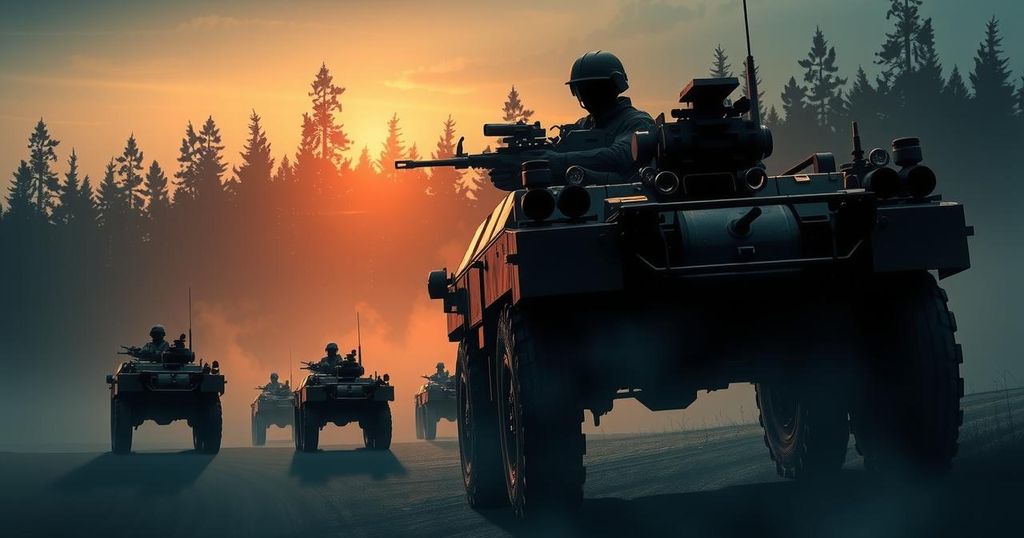DR Congo President Felix Tshisekedi announced a vigorous military response to the advance of M23 rebels while criticizing the international community’s inaction. The M23’s territorial gains, including Goma, have intensified the humanitarian crisis, displacing thousands. Local protests erupted due to frustrations over food and medical shortages, while Rwanda continues to deny military involvement, asserting its fight against regional militants. The situation underscores the ongoing security challenges in the region, linked to the legacy of the Rwandan genocide.
Democratic Republic of Congo (DRC) President Felix Tshisekedi announced that the DRC military is executing a robust response to the advance of the M23 armed group, allegedly backed by Rwanda. Tshisekedi criticized the international community for its inaction amid escalating violence, which has resulted in significant territorial gains for the M23, including the key city of Goma. He described the West’s silence on the crisis as “an affront” to the DRC, highlighting the deteriorating security situation that could impact the broader Great Lakes region.
The M23’s recent advances have prompted urgent calls for dialogue and intervention, with the East African Community urging the DRC government to engage with various stakeholders, including the M23. Despite international pressure, Tshisekedi refrained from attending a crisis summit with Rwandan President Paul Kagame. Meanwhile, M23 forces continued to seize districts in South Kivu, exacerbating the humanitarian crisis as food and water shortages plague the region, displacing hundreds of thousands.
The escalating conflict in eastern DRC is a reminder of the area’s long history of violence linked to the aftermath of the 1994 Rwandan genocide. The fighting has aggravated pre-existing humanitarian challenges, forcing communities to flee their homes in search of safety and basic necessities. Furthermore, the presence of Rwandan troops in the DRC has drawn international condemnation, with multiple nations demanding an immediate withdrawal and cessation of hostilities.
Amidst the chaos, local residents in Goma expressed their fears regarding hunger and lack of medical resources while voicing frustrations about the humanitarian conditions. Protests erupted in Kinshasa, led by citizens accusing foreign embassies of indifference towards the crisis. In response to the ongoing violence, several nations, including the United States and Belgium, have advised their citizens against travel to the DRC, highlighting the deteriorating security landscape.
As tensions mount, Rwanda has continued to assert its position regarding the M23, dismissing claims of military involvement while maintaining that its objective is to combat regional militant threats. Both the DRC and international observers remain concerned about the implications of these developments on the region, particularly given the DRC’s rich mineral resources that have historically fueled conflict.
In summary, the ongoing violence in eastern DRC poses substantial risks not only to internal stability but also to the security of the entire Great Lakes region. The response from President Tshisekedi and the DRC military will be closely monitored as the situation unfolds, alongside international diplomatic efforts aimed at resolving the crisis.
The Democratic Republic of Congo has faced ongoing conflict, particularly in its eastern regions, where multiple armed groups have historically fought for control over rich mineral resources. The resurgence of the M23 rebel group, backed by Rwanda, has reignited fears of a humanitarian catastrophe amid calls for international intervention and diplomatic dialogue. Understanding the historical context, particularly the links to the Rwandan genocide, is crucial for comprehending the current conflict dynamics and the complexities faced by the DRC.
The situation in the Democratic Republic of Congo remains precarious as President Tshisekedi emphasizes the need for a concerted military response to the challenges posed by the M23 rebels. The universal call for diplomatic discussions highlights the necessity of addressing both the immediate and underlying issues fueling the violence. The international community’s role will be critical in facilitating dialogues to alleviate the humanitarian crisis and stabilize the region moving forward.
Original Source: www.france24.com






